- How Much Weight Can You Realistically Lose in 3 Months? - January 14, 2024
- How To Lose 1kg a Week (Guaranteed) - August 20, 2023
- How To Count Calories (or Estimate) and Stay on Track When Eating Out at Restaurants - July 25, 2023
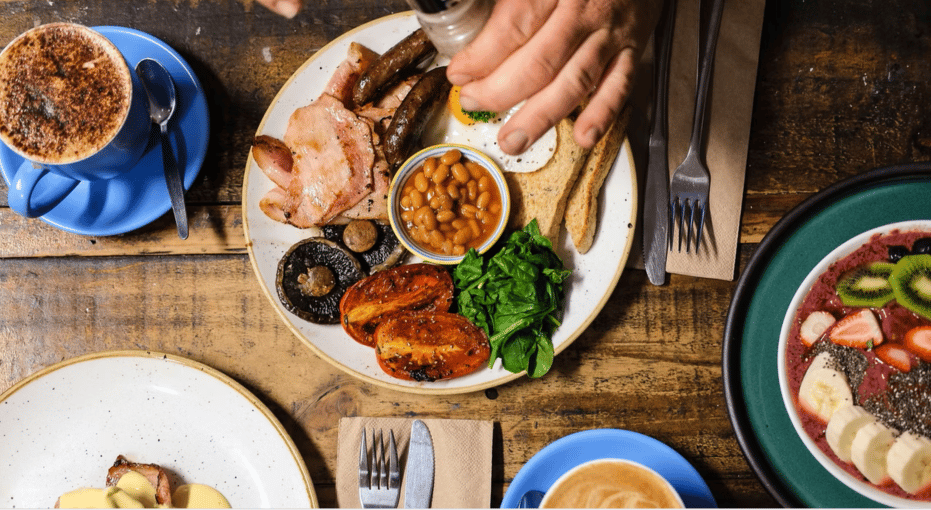
Skip breakfast, don’t skip breakfast, we’ve all heard it before; this is one of the oldest and most tired debates in nutrition but what’s the truth?
Does skipping breakfast really help you lose weight? Or is eating breakfast actually better if you’re trying to shift a few pounds?
Annoying, the answer is a vague ‘it depends’.
You can actually lose weight while eating breakfast, or skipping it totally.
The ‘skipping breakfast’ debate isn’t black and white and there isn’t a ‘one size fits all’ answer. Skipping breakfast will however work better for some people than it will for others.
So, what aspects of skipping breakfast vs not skipping breakfast could work for you?
Pros
- Saves time in the morning, which may make you less stressed. And may mean you can have a little more sleep
- Allows you to eat more calories at lunch and dinner, if you prefer doing that
- If you don’t get hungry in the morning, there’s no real disadvantage
- If you train first thing in the morning, you may feel more comfortable and not suffer from indigestion
Cons
- May make you more hungry later on during the day, causing you to eat more overall
- If you do train first thing in the morning, it may mean you have less energy
- You could miss out on essential nutrients like Vitamin C in fruit, Fibre in wholegrain and Calcium in dairy (if you don’t eat them at other times during the day)
- If you don’t eat breakfast, it could mean you make fewer healthy choices later in the day
As you can see, there is no right answer.
Skipping breakfast is probably better for people that have low appetite in the morning, or train right after waking. It may also be a favourable tactic for people that like eating a big lunch and/or dinner, as it allows them more calories to play with later in the day.
On the other hand, if you find that you’re hungry upon waking, then eating as soon as you get up probably isn’t a bad idea. Doing so will mean that your blood sugar levels will remain a lit
What Does Breakfast Actually Mean?
Breakfast literally means ‘breaking the fast’, or the first meal after you wake up, so whatever you eat first after waking up is your ‘breakfast’, regardless of what time it is.
This means that ‘breakfast’ doesn’t necessarily mean a meal you’d eat at a traditional ‘breakfast time’, i.e. 6am-10am, but rather, your first meal after waking.
Is ‘Don’t Skip Breakfast A Myth?
There’s no way of telling for certain, but it’s likely that the ‘don’t skip breakfast’ message originated with James Caleb Jackson and John Harvey Kellog as a subtle PR message designed to sell Kellog’s cereal.
This myth still persists today, and you’ll likely hear people rehashing the tired old adage ‘’breakfast is the most important meal of the day’’.
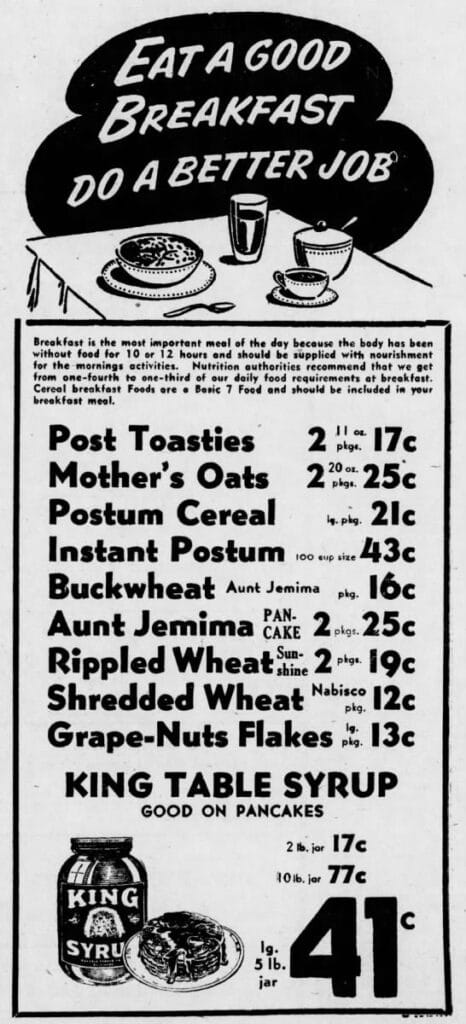
While it’s true that breakfast is the first meal of the day, can we really put any stock in the claim that it’s the most important?
In short, the answer is no.
If you’re trying to lose weight, you need to create a calorie deficit, and that means eating fewer calories than you use each day, consistently over a period of time.
Now, it’s possible to create a calorie deficit regardless of whether or not you eat breakfast.
But what about from a health point of view?
You’ve probably also seen a ton of scaremongering articles claiming “here’s what happens to your body when you skip breakfast”.
Does your metabolism slow down?
Is your insulin impacted?
Do you miss out in important nutrients?
The truth is absolutely nothing happens when you skip breakfast. Yep, nothing.
It could mean that you do miss out on some nutrients if you only eat fruit, eggs, wholegrain or dairy at breakfast, but as long as you’re vigilant about your overall throughout the day, there’s no reason this has to happen.
So, in summary, the ‘don’t skip breakfast myth’ was established to sell Kellogs cereal, and it’s persisted because clickbait-happy publications want to get your attention.
The uninteresting, unsexy reality is that it really doesn’t matter whether you eat breakfast or not, you can lose weight just as effective either way.
Still don’t believe me?
Let’s look at two examples;
This is what a typical day looks like for the average person, with three square meals and a snack.
Eating Breakfast
| MEAL | CALORIES |
| Breakfast | 350 |
| Lunch | 750 |
| Snack | 200 |
| Dinner | 900 |
| TOTAL | 2,200 |
And this what a day might look like for someone skipping breakfast. You can see that lunch and dinner contain more calories, so when you look at the total calorie intake for the day, there’s absolutely no difference
Skipping Breakfast
| MEAL | CALORIES |
| Breakfast | 0 |
| Lunch | 900 |
| Snack | 200 |
| Dinner | 1,100 |
| TOTAL | 2,200 |
What Does the Latest Science Say?
Having an opinion is all very well, and while I might advise you not to skip breakfast, another coach might tell you that skipping it is a great idea.
Neither is the right answer, it’s all subjective and depends on your individual circumstances.
What we can do is look at a few recent studies to help us make a decision about what’s right.
Perhaps most interestingly, and what I’d put the most stock in, is this 2014 study carried out over 16 weeks on 309 participants. which observed no discernable of either skipping breakfast, or eating breakfast on weight loss
This study looked at the differences between three different groups of participants, one (control) group eating three meals per day, one skipping breakfast, and one skipping dinner these different days were isocaloric (calorie matched). The results showed that the two groups skipping a meal had higher energy expenditure throughout the day, with the breakfast skipping group burning an extra 41 calories, and the dinner skipping group burning an extra 91 calories.
Interestingly a different study came to similar conclusions, claiming that there was no metabolic adaptation that occurred as a result of eating breakfast and no change in appetite. In this case, it was found that energy expenditure from physical activity was higher when eating breakfast. This is likely because people had more energy and worked harder and faster.
This study looked at the scientific methods and reporting styles around studies related to skipping breakfast and found that there is a very weak link between skipping breakfast and obesity and that this supposed link is overemphasized in studies
Based on these studies, we can say that the weight of scientific evidence that either supports skipping or eating breakfast for weight loss simply isn’t there.
This supports my earlier point that it really doesn’t matter whether you skip breakfast or not, what really matters is your overall daily calorie balance.
Focusing on that, and being in a sustainable calorie deficit is what will genuinely affect your weight loss efforts.
The Pros and Cons of Skipping Breakfast
Hopefully, you’ve realised by now that the ‘skipping breakfast’ debate isn’t black and white and there isn’t a ‘one size fits all’ answer. Skipping breakfast will however work better for some people than it will for others.
So, what aspects of skipping breakfast vs not skipping breakfast could work for you?
Pros
- Saves time in the morning, which may make you less stressed. And may mean you can have a little more sleep
- Allows you to eat more calories at lunch and dinner, if you prefer doing that
- If you don’t get hungry in the morning, there’s no real disadvantage
- If you train first thing in the morning, you may feel more comfortable and not suffer from indigestion
Cons
- May make you more hungry later on during the day, causing you to eat more overall
- If you do train first thing in the morning, it may mean you have less energy
- You could miss out on essential nutrients like Vitamin C in fruit, Fibre in wholegrain and Calcium in dairy (if you don’t eat them at other times during the day)
- If you don’t eat breakfast, it could mean you make fewer healthy choices later in the day
As you can see, there is no right answer.
Skipping breakfast is probably better for people that have low appetite in the morning, or train right after waking. It may also be a favourable tactic for people that like eating a big lunch and/or dinner, as it allows them more calories to play with later in the day.
On the other hand, if you find that you’re hungry upon waking, then eating as soon as you get up probably isn’t a bad idea. Doing so will mean that your blood sugar levels will remain a little more consistent; and while that won’t directly influence weight loss, it may mean it’s less likely that you’ll overeat later in the day.
If You Do Eat Breakfast, What Should You Eat?
So, you’ve decided you are going to eat breakfast, good for you. Breakfast is delicious!
But what should you eat if you’re trying to lose weight?
A full English fry-up or a stack of pancakes and waffles may not be the best options.
This 2019 study on 37 overweight adolescents found that high protein breakfasts had a positive effect on satiety. That is to say, the participants that ate a high protein breakfast (350 calories and 25g of protein) vs a normal protein breakfast (350 and 13g of protein) felt fuller, and had less drive to eat more later in the day.
So, what should you eat for breakfast?
Well, you should be prioritising foods like;
- Eggs
- Egg whites
- Lean meat like Bacon medallions or turkey bacon
- Low-fat dairy like Greek Yogurt
- Fruit
- Porridge
All of these foods are either high in protein, high in fibre or relatively low in calories. What this means is, these foods will help keep you full without having a huge impact on your calorie budget for the day.
Here are a couple of ideas from my healthy recipe book, including some of the foods above, that you might want to try.
MEXICAN SCRAMBLED EGGS
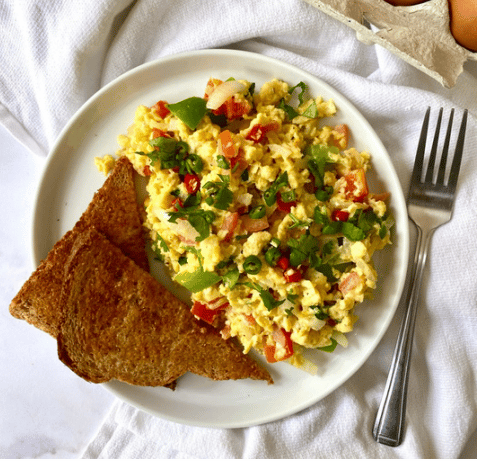
SERVES: Two
SUITABLE FOR: Vegetarians
MACROS AND CALORIES: 326 calories, 23.9g fat, 13g carbs, 23.2g protein.
INGREDIENTS:
15ml olive oil
4 eggs
1 small onion, finely diced
1 red bell pepper, finely diced
1 green bell pepper, finely diced
60g grated low-fat cheddar 1-2 chillies (optional), finely diced
Splash of milk Salt and pepper to taste
Chopped fresh coriander to garnish
- Heat the olive oil in a non-stick frying pan on a medium-high heat and add the onions.
2. Sauté for a few minutes or until soft.
3. Add in the bell peppers and chillies and cook for a further 2 minutes or so.
4. In the meantime, whisk the eggs, milk, salt and pepper in a bowl.
5. Pour the eggs into the frying pan and allow to cook, stirring occasionally.
When the eggs have started to set, add in the cheese and stir well.
6. Garnish with fresh coriander and serve immediately.
PROTEIN PANCAKES
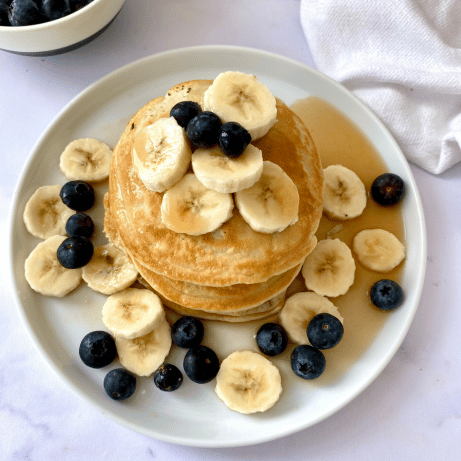
SERVES: One
SUITABLE FOR: Vegetarians
MACROS AND CALORIES: (with Egg whites): 317 calories, 4.6g fat, 30.4g carbs, 36.9g protein (with Whole eggs): 355 calories, 9.3g fat, 30.2g carbs, 35.5g protein.
INGREDIENTS:
40g Oats
30g protein powder
70ml egg whites or 1 large egg
350-100ml almond milk or milk of choice (use more or less as needed to thin the batter)
1/2 tsp baking powder
1 tsp vanilla essence
Optional extras: chocolate chips, berries, banana, nut butter, syrup, honey, jam, nutella, biscoff spread.
- Blend the oats, protein powder and baking soda in a blender or food processor.
2. Add egg whites or egg, vanilla essence and almond milk if needed.
3. Add in any extras such as chocolate chips or nuts.
4. Heat a non-stick pan with some cooking spray and pour a scoop of batter onto the pan.
5. When bubbles have started to form, flip and cook the other side.
6. Repeat until the batter is used up.
7. Serve with toppings of choice.
BREAKFAST HASH
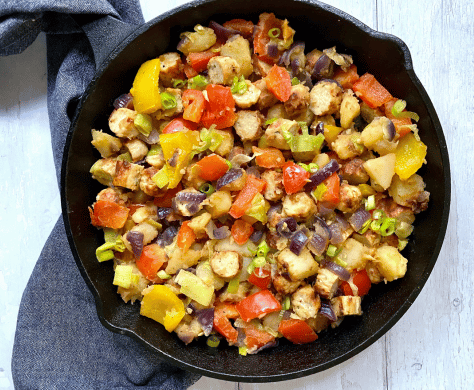
SERVES: Four
SUITABLE FOR: Carnivores
MACROS AND CALORIES PER SERVE: 277 calories, 7g fat, 35g carbs, 20g protein.
INGREDIENTS:
Serve with eggs or as is
1 packet low-fat chicken sausages (eg Heck), sliced into rounds
500g white potato (eg Maris piper), peeled and cubed
15ml olive oil
100g leek, finely sliced
1 red onion, chopped
1 red bell pepper, chopped
1 yellow bell pepper, chopped
2 garlic cloves, minced
2 tsp smoked paprika
Salt and pepper to taste
Optional extras: eggs and/or bacon
- Heat the oil in a deep skillet or pan on a medium-high heat.
2. Add the potatoes, season with salt and pepper and fry for 5-10 minutes, until the potatoes get crispy and brown
3. Add the sausage and cook until brown.
4. Add the onion and sauté for a few minutes, until soft.
5. Add the bell peppers, leek and garlic to the pan, along with the paprika and more salt and pepper as needed.
6. Stir thoroughly. Cook for 5-10 minutes, until the vegetables are soft.
Is Skipping breakfast the Same as Intermittent Fasting?
Skipping breakfast is essentially the same as intermittent fasting.
Most intermittent fasting protocols require you to not eat for certain periods of time, for example, the 16:8 fasting protocol requires you to only eat for an 8-hour window each day.
Most people will have their eating window between 12 midday and 8pm. This means that you need fast between 8.01pm and 11.59am, which essentially means skipping breakfast.
So, if your eating window is in the kater part of the day, intermittent fasting and skipping breakfast are exactly the same.
Of course, if your eating window is earlier in the day, then you won’t be skipping breakfast, but skipping dinner instead (if your fasting window is 8am to 4pm for example).
So, whether we call it ‘skipping breakfast’, ‘intermittent fasting’ or ‘one meal a day (OMAD)’, the end result is exactly the same; we’re just finding different ways to restrict calories.
None of these approaches are ‘magic’, they’re just methods to achieve the principle of a calorie deficit
Is it Better to Skip Lunch, or Dinner..?
So, taking all of this on-board, if you’re going to skip a meal, is breakfast really the best option?!
In the US, almost a quarter of people skip breakfast every day, Breakfast also makes up on average 16% of people’s daily calorie intake, while dinner makes up 44% on average, so even people that do eat breakfast, don’t each much.
This means that if we assume an average daily energy intake of 2,000 calories, 320 would come from breakfast, and 880 would come from dinner, leaving 800 from lunch.
This means that if you are looking to lose weight, and you’re thinking of skipping breakfast, it may actually make much more sense to skip lunch or dinner as you’ll get more ‘bang for your buck’ by skipping these meals (as they generally contain more calories).
Of course, the overall aim is to reduce calorie intake and achieve a calorie deficit, and there’s no ‘perfect way of doing this’.
You could simply carry on eating 3 meals per day and reduce the calories in each meal. Or you could reduce the calories in one meal.
Different approaches will work for different people which is why a totally flexible approach to dieting is the holy grail for the majority.
Summary
It really doesn’t matter whether or not you eat breakfast.
The main benefit of eating breakfast is that you’ll likely have more energy earlier in the day, feel fuller meaning you’re less likely to overeat and practice other healthy daily habits like exercise and sleep.
Having said all of this, there’s nothing ‘magic’ about breakfast, and eating breakfast doesn’t automatically mean you’ll be healthier or lose more weight.
You can be equally healthy and lose just as much weight by skipping breakfast.
What’s really important is the quality and variety of your nutrition, and your overall average daily calorie intake, not WHEN you eat and how you organise your meals.
If you’re hungry in the morning and you like eating breakfast, and if you don’t, don’t.
References
The effectiveness of breakfast recommendations on weight loss: a randomized controlled trial: https://academic.oup.com/ajcn/article/100/2/507/4576452
Habitual Breakfast Patterns Do Not Influence Appetite and Satiety Responses in Normal vs. High-Protein Breakfasts in Overweight Adolescent Girls: https://www.mdpi.com/2072-6643/11/6/1223
Belief beyond the evidence: using the proposed effect of breakfast on obesity to show 2 practices that distort scientific evidence: https://academic.oup.com/ajcn/article/98/5/1298/4577332?version=meter+at+18&module=meter-Links&pgtype=article&contentId=&mediaId=&referrer=https%3A%2F%2Fwww.google.com%2F&priority=true&action=click&contentCollection=meter-links-click
Why don’t more people eat breakfast? A biological perspective: https://academic.oup.com/ajcn/article/103/6/1555/4569626
The causal role of breakfast in energy balance and health: a randomized controlled trial in lean adults: https://pubmed.ncbi.nlm.nih.gov/24898233/
Why don’t more people eat breakfast? A biological perspective: https://academic.oup.com/ajcn/article/103/6/1555/4569626
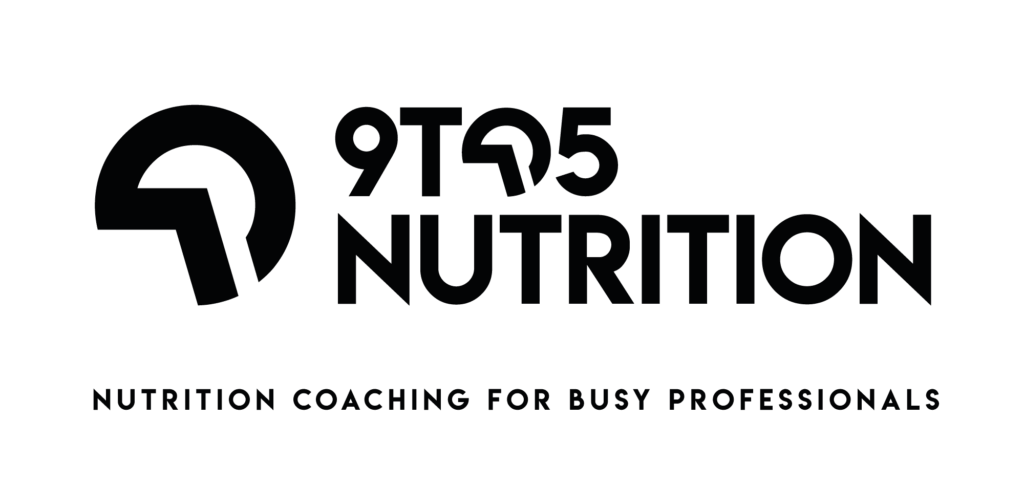
Leave a Reply